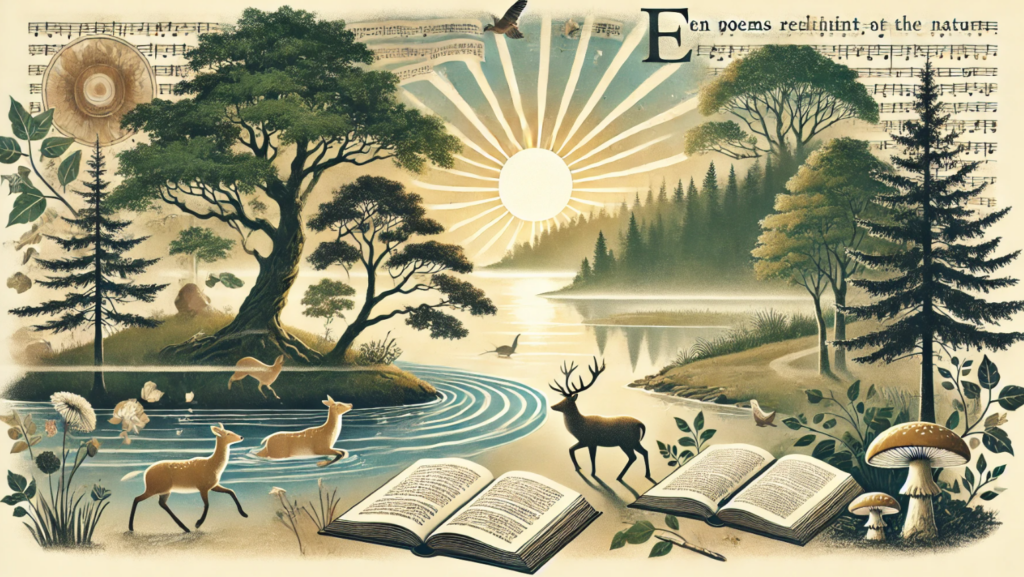
Here are ten poems that are highly relevant to the concept of nature as a religion. These poems explore themes of reverence for nature, spiritual connection, and the profound impact of the natural world on the human soul.
1. “Lines Written a Few Miles Above Tintern Abbey” by William Wordsworth
- Summary: Wordsworth reflects on his deep connection to nature and the spiritual solace it provides. The poem emphasizes the restorative power of the natural world and its role in shaping the human spirit.
- Excerpt:
Therefore am I still
A lover of the meadows and the woods,
And mountains; and of all that we behold
From this green earth; of all the mighty world
Of eye, and ear,—both what they half create,
And what perceive; well pleased to recognize
In nature and the language of the sense,
The anchor of my purest thoughts, the nurse,
The guide, the guardian of my heart, and soul
Of all my moral being.2. “The Peace of Wild Things” by Wendell Berry
- Summary: Berry finds solace and peace in nature, away from the anxieties of human life. The poem underscores the spiritual tranquility and freedom offered by the natural world.
- Excerpt:
I come into the peace of wild things
who do not tax their lives with forethought
of grief. I come into the presence of still water.
And I feel above me the day-blind stars
waiting with their light. For a time
I rest in the grace of the world, and am free.3. “God’s Grandeur” by Gerard Manley Hopkins
- Summary: Hopkins celebrates the divine presence in nature, lamenting humanity’s failure to recognize it while finding hope in nature’s resilience and renewal.
- Excerpt:
The world is charged with the grandeur of God.
It will flame out, like shining from shook foil;
It gathers to a greatness, like the ooze of oil
Crushed. Why do men then now not reck his rod?4. “When I Am Among the Trees” by Mary Oliver
- Summary: Oliver describes the trees as wise beings that offer guidance and peace, reflecting her deep spiritual connection to the natural world.
- Excerpt:
Around me the trees stir in their leaves
and call out, “Stay awhile.”
The light flows from their branches.
And they call again, “It’s simple,” they say,
“and you too have come
into the world to do this, to go easy, to be filled
with light, and to shine.”5. “To Autumn” by John Keats
- Summary: Keats personifies autumn as a deity, celebrating its beauty and the natural cycle of growth and decay, reflecting a reverence for the natural world.
- Excerpt:
Season of mists and mellow fruitfulness,
Close bosom-friend of the maturing sun;
Conspiring with him how to load and bless
With fruit the vines that round the thatch-eves run;6. “Sleeping in the Forest” by Mary Oliver
- Summary: Oliver describes a night spent immersed in nature, feeling a profound sense of belonging and spiritual peace within the natural world.
- Excerpt:
I thought the earth remembered me,
she took me back so tenderly, arranging
her dark skirts, her pockets
full of lichens and seeds.7. “This World” by Mary Oliver
- Summary: Oliver reflects on the sacredness of the natural world and its capacity to inspire and renew the human spirit.
- Excerpt:
I would like to write a poem about the world that has in it
nothing fancy.
But it seems impossible.8. “The Snow Man” by Wallace Stevens
- Summary: Stevens explores the idea of perceiving nature without human imposition, experiencing it in its pure, unadulterated form, akin to a spiritual practice.
- Excerpt:
One must have a mind of winter
To regard the frost and the boughs
Of the pine-trees crusted with snow;9. “Inversnaid” by Gerard Manley Hopkins
- Summary: Hopkins celebrates the wild beauty of nature, expressing a deep reverence for its untamed and unspoiled aspects.
- Excerpt:
What would the world be, once bereft
Of wet and of wildness? Let them be left,
O let them be left, wildness and wet;
Long live the weeds and the wilderness yet.10. “The Darkling Thrush” by Thomas Hardy
- Summary: Hardy finds hope and spiritual solace in the song of a thrush during a bleak winter landscape, reflecting nature’s capacity to inspire and uplift.
- Excerpt:
So little cause for carolings
Of such ecstatic sound
Was written on terrestrial things
Afar or nigh around,
That I could think there trembled through
His happy good-night air
Some blessed Hope, whereof he knew
And I was unaware.These poems collectively emphasize the spiritual and religious significance of nature, exploring themes of reverence, solace, interconnectedness, and the divine presence within the natural world.